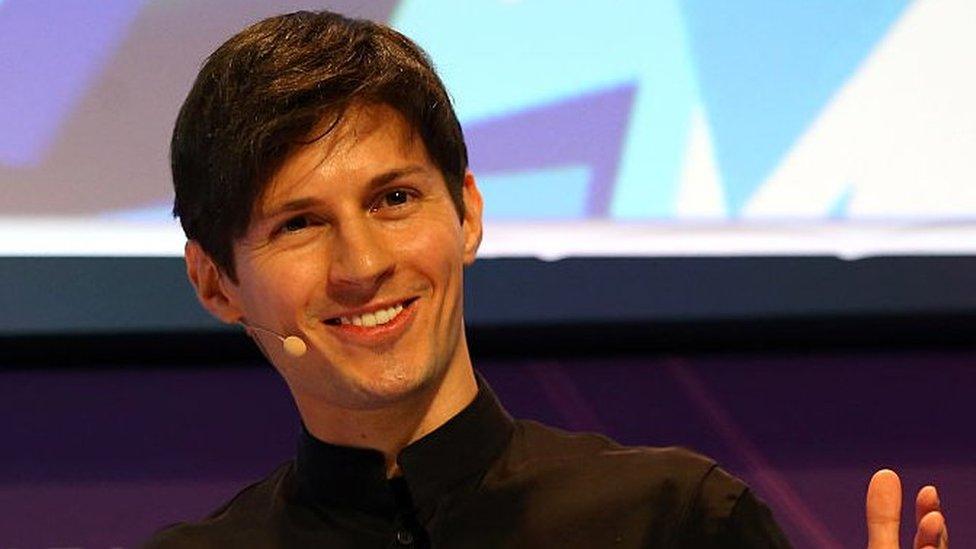Telegram founder commits to Ukraine user privacy
- Published

The billionaire Russian-born co-founder of messaging app Telegram has told Ukrainian users their data is safe.
In a Telegram post, Pavel Durov, who lives in Dubai, wrote, external: "I stand for our users no matter what. Their right to privacy is sacred - now more than ever."
Telegram was Ukraine's most popular messaging app - the Observer newspaper reported, external.
But some experts have raised concerns about the security of users' data.
Moxie Marlinspike, who developed the encryption used by rival platforms Signal- which he created - and WhatsApp, tweeted, external many users thought Telegram was an encrypted app, but it was "by default a cloud database with a plaintext copy of every message everyone has ever sent/received".
Telegram maintains everything stored on its cloud is securely encrypted, however while all of its data is protected only some of its features use end-to-end encryption.
'Any cost'
So-called Secret Chats, voice calls and video calls are end-to-end encrypted, external on Telegram so cannot be read by the company.
But in theory the company could access other encrypted content stored on Telegram's servers.
And there have been concerns it could be forced to share user data with Russia.
But on Monday, its founder wrote a Telegram post the company said was "a commitment to protect user data at any cost".
Allow X content?
This article contains content provided by X. We ask for your permission before anything is loaded, as they may be using cookies and other technologies. You may want to read X’s cookie policy, external and privacy policy, external before accepting. To view this content choose ‘accept and continue’.
In the post, Mr Durov stressed his Ukranian heritage, on his mother's side, writing the "tragic conflict is personal both to me and Telegram".
"Some people wondered if Telegram is somehow less secure for Ukrainians, because I once lived in Russia," he wrote.
"Let me tell these people how my career in Russia ended."
Nine years ago, he had been chief executive of VK, a social network popular in Russia and Ukraine, Mr Durov wrote.
"In 2013, the Russian security agency, FSB, demanded that I provide them the private data of the Ukrainian users of VK who were protesting against a pro-Russian president," he said.
"I refused to comply with these demands, because it would have meant a betrayal of our Ukrainian users.
"After that, I was fired from the company I founded and was forced to leave Russia."
Billion downloads
As a result, he had lost his company and his home - but he would do it again.
"I smile with pride when I read my VK post from April 2014, which shows the scanned orders from the FSB and my trademark response to them - a dog in a hoodie," Mr Durov wrote.
Last year, Telegram, based in Dubai, reached a billion downloads.
What's behind Telegram's growing popularity?
Users can set up:
groups with up to 200,000 users
channels an unlimited number can follow
Ukraine's President, Volodymyr Zelenskiy, has used the app, which is home to many official Ukrainian government channels
Telegram was banned in Russia in 2018, after a previous refusal by Mr Durov to hand over user data.
But the ban was reversed in 2021, external.
And since the invasion of Ukraine, some Russian-language channels have seen increasing audiences.
Jordan Wildon, an analyst at Logically which analyses disinformation, said Russian-language channels that it monitors on Telegram have gained 2.7 million followers since the 24 February.
"About 800,000 of those were within the past week. We saw the most significant increase between the 24th and 28th" he said.
On 4 March, following sanctions and similar moves by the big social networks, Telegram blocked Russian state-backed media from its platform in the EU, external.
Mr Wildon said that after that date, "there was a notable drop in total followers. This appears to be due to actions taken by Telegram to restrict state media. However, total followers across the 183 Russian-language channels we monitor have been slowly increasing back to pre-restrictions levels."
Mr Durov has previously voiced concerns about unverified information on the platform.
He had reportedly considered pulling the plug partially or completely on channels in countries involved in the conflict for the duration of hostilities, saying he did not want "Telegram to be used as a tool that exacerbates conflicts and incites ethnic hatred".
But after appeals from users who said they relied on the app, he relented, while warning: "Double-check and do not take on faith the data that is published in Telegram channels during this difficult period."

War in Ukraine: More coverage
EXPLAINED: Why Putin has invaded Ukraine?
IN DEPTH: Full coverage of the conflict

Related topics
- Published16 February 2022

- Published17 February 2022
- Published20 October 2021
